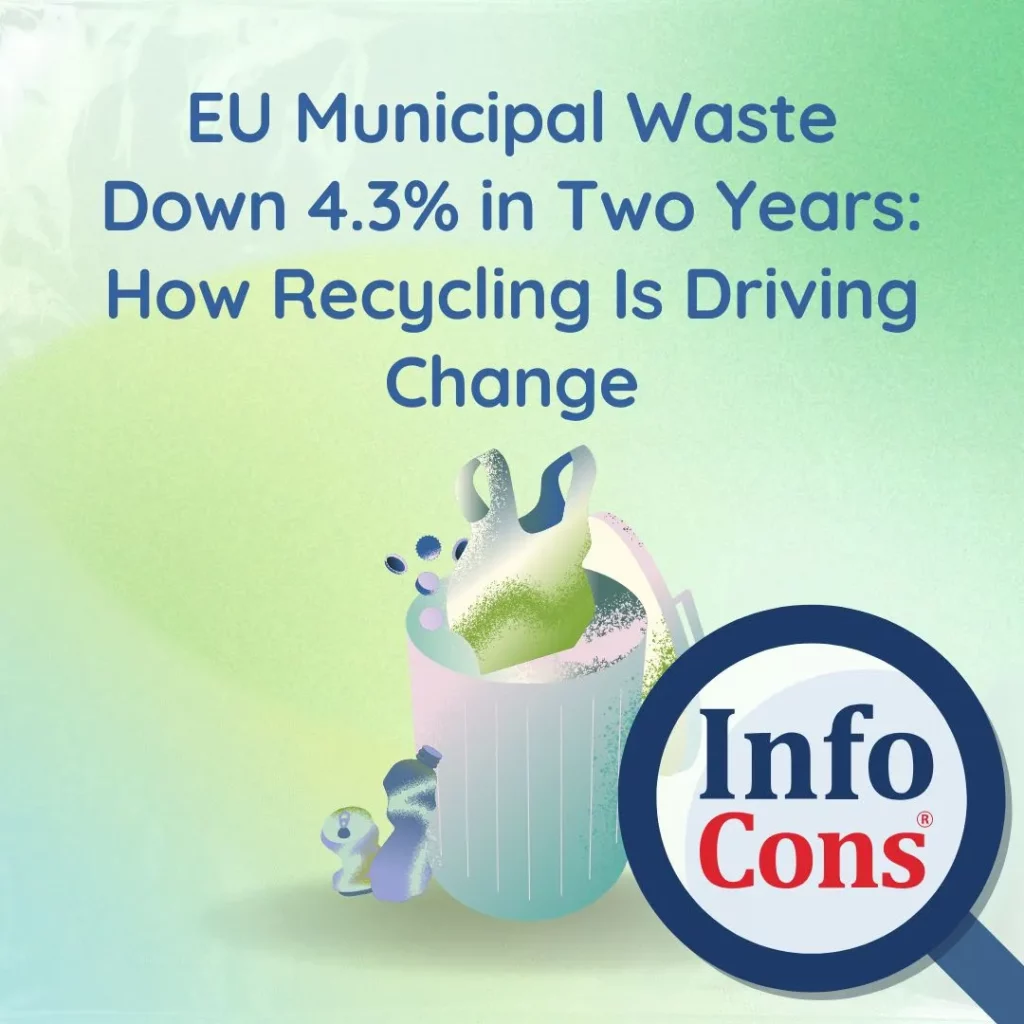
Waste management is a critical component of sustainability efforts across the European Union (EU). As the EU works toward reducing its environmental footprint, trends in municipal waste generation and recycling provide valuable insights into progress. Recent data reveals encouraging signs: municipal waste per person has decreased for the second consecutive year in 2023. While this progress is notable, the differences in waste generation and recycling rates across member states highlight the challenges of creating a unified approach to waste management.
Municipal Waste Per Person Drops for Two Consecutive Years
In 2023, the average amount of municipal waste generated per person in the EU was 511 kilograms, marking a decline of 4 kilograms from 2022 (515 kg) and a more significant drop of 23 kilograms compared to 2021 (534 kg). This represents a 4.3% reduction in waste generation over two years. However, when looking back to 2013, there has been an overall increase of 32 kilograms per person, suggesting that while recent progress has been made, long-term waste reduction remains a challenge.
Read also : EU E-Commerce Imports : New Regulations to Ensure Safety & Sustainability
Regional Disparities in Waste Generation
The data highlights notable differences in municipal waste generation across EU member states. In 2022, Austria, Denmark, and Luxembourg reported the highest levels of waste per person, with Austria leading at 803 kilograms per person, closely followed by Denmark (802 kg) and Luxembourg (712 kg).
Conversely, the lowest levels of waste generation were observed in Romania (303 kg per person), Poland (367 kg), and Estonia (373 kg). These disparities reflect differences in consumption patterns, waste management practices, and economic factors across the EU, underscoring the need for tailored strategies to address waste challenges in individual countries.
Progress in Recycling: Almost Half of Waste Recycled in 2023
Recycling efforts in the EU have seen significant improvement over the past decade. In 2023, the average amount of municipal waste recycled reached 246 kilograms per person, representing 48.0% of the total waste generated. This marks a substantial increase from 2013, when only 37.2% of municipal waste (199 kg per person) was recycled.
This upward trend in recycling rates demonstrates the impact of policy measures, technological advancements, and increased public awareness around sustainable waste management. However, there is still room for improvement to meet the EU’s ambitious targets for circular economy and waste reduction.
Read also : Epilepsy Prevention : How 1 in 4 Cases Can Be Avoided
How Is the Rest of the Waste Managed?
Beyond recycling, other methods of waste management include incineration and landfill disposal. In 2023, an average of 129 kilograms per person—25.2% of total waste generated—was incinerated, a slight increase from 127 kilograms (26.4%) in 2013.
Landfill use has seen a notable decline, with 115 kilograms per person (22.5%) of municipal waste ending up in landfills in 2023. This marks a significant reduction from 2013, when 142 kilograms per person (29.7%) were sent to landfills. These shifts reflect the EU’s ongoing efforts to reduce landfill dependency and promote more sustainable waste management practices.
Toward a Sustainable Future in Waste Management
The reduction in municipal waste per person over the past two years is a positive development for the EU’s environmental goals. The increase in recycling rates and the decrease in landfill use highlight progress in creating a more sustainable waste management system.
However, regional differences in waste generation and recycling practices reveal that there is no one-size-fits-all solution. Countries with higher waste generation levels must prioritize reducing consumption and improving waste diversion practices, while those with lower levels should continue building on their achievements.
With continued collaboration and commitment, the EU can further reduce municipal waste and pave the way for a sustainable future where resources are reused and waste is minimized.
Read also : EU Exports and Imports of Services Reach New Heights , According to Recent Data
Source : Eurostat
InfoCons – European Organization for Consumer Protection and Promotion of Programs and Strategies , a full member of the World Organization Consumers International , founding member of the Federation of Consumer Associations , and member of ANEC .